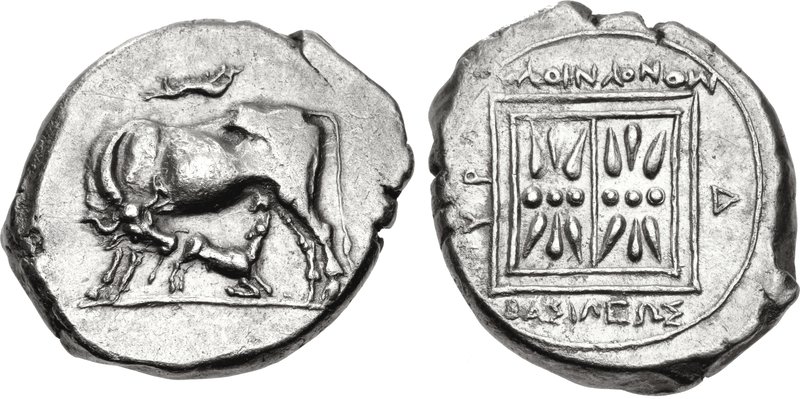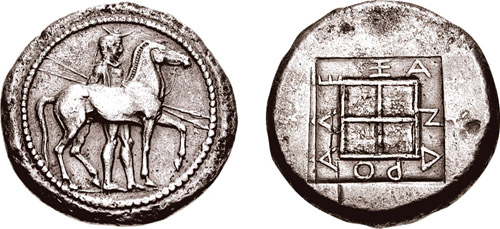|
Bardylis II
Bardylis II (Ancient Greek: Βάρδυλις; ruled ''c.'' 295290 ) was an Illyrian king, and presumably the son of Cleitus, and grandson of Bardylis. He was the father of Bircenna, wife of Pyrrhus of Epirus. Bardylis II is the only attested Illyrian king after Glaucias' death. He may have succeeded Glaucias on the throne as the grandson of Bardylis I, or alternatively he may have reigned independently after his father Cleitus somewhere in Dassaretia, in an area located nearer the Macedonian border. At that time Bardylis II was evidently the most powerful king in Illyria who could unite the largest number of Illyrian tribes under his rule. Biography Bardylis II, also called Bardylis the Younger, was presumably the son of Cleitus and grandson of Bardylis, both enemies of the Macedonian kingdom. A feat of these dimensions could be achieved only through war against Macedonia and, apparently, also against the heirs of Glaucias. Bardylis II might have absorbed or inherited Gl ... [...More Info...] [...Related Items...] OR: [Wikipedia] [Google] [Baidu] |
Ancient Greek
Ancient Greek includes the forms of the Greek language used in ancient Greece and the ancient world from around 1500 BC to 300 BC. It is often roughly divided into the following periods: Mycenaean Greek (), Dark Ages (), the Archaic period (), and the Classical period (). Ancient Greek was the language of Homer and of fifth-century Athenian historians, playwrights, and philosophers. It has contributed many words to English vocabulary and has been a standard subject of study in educational institutions of the Western world since the Renaissance. This article primarily contains information about the Epic and Classical periods of the language. From the Hellenistic period (), Ancient Greek was followed by Koine Greek, which is regarded as a separate historical stage, although its earliest form closely resembles Attic Greek and its latest form approaches Medieval Greek. There were several regional dialects of Ancient Greek, of which Attic Greek developed into Koine. Dia ... [...More Info...] [...Related Items...] OR: [Wikipedia] [Google] [Baidu] |
Macedon
Macedonia (; grc-gre, Μακεδονία), also called Macedon (), was an ancient kingdom on the periphery of Archaic and Classical Greece, and later the dominant state of Hellenistic Greece. The kingdom was founded and initially ruled by the royal Argead dynasty, which was followed by the Antipatrid and Antigonid dynasties. Home to the ancient Macedonians, the earliest kingdom was centered on the northeastern part of the Greek peninsula,. and bordered by Epirus to the west, Paeonia to the north, Thrace to the east and Thessaly to the south. Before the 4th century BC, Macedonia was a small kingdom outside of the area dominated by the great city-states of Athens, Sparta and Thebes, and briefly subordinate to Achaemenid Persia. During the reign of the Argead king PhilipII (359–336 BC), Macedonia subdued mainland Greece and the Thracian Odrysian kingdom through conquest and diplomacy. With a reformed army containing phalanxes wielding the ''sarissa'' pike, PhilipII d ... [...More Info...] [...Related Items...] OR: [Wikipedia] [Google] [Baidu] |
Dardanians
Dardania, Dardanian or Dardanians may refer to ancient peoples or locations. People * Dardani, an ancient tribe in the Balkans * Dardanians (Trojan) (''Dardanoi''), a people closely related to the Trojans and believed to be related to the Dardani * Bato of Dardania (ruled c. 206–176 BC), Illyrian king of the Dardanian State * Capys of Dardania, king of Dardania during the ''Iliad'' and ''Aeneid'' * Cleitus of Dardania (ruled c. 356–335 BC), Illyrian ruler * Erichthonius of Dardania, king of Dardania in Greek mythology * Ilus of Dardania, king of Dardania in Greek mythology * Monunius of Dardania (ruled c. 176–167 BC), Illyrian king of the Dardanian State Places * Kingdom of Dardania The Kingdom of Dardania was a polity formed in the central Balkans in the region of Dardania during classical antiquity. It is named after the Dardani, a Paleo-Balkan tribe which formed its population and formed the core of the Dardanian polity. ..., an ancient kingdom in the Balkans estab ... [...More Info...] [...Related Items...] OR: [Wikipedia] [Google] [Baidu] |
3rd-century BC Rulers
The 3rd century was the period from 201 ( CCI) to 300 (CCC) Anno Domini (AD) or Common Era (CE) in the Julian calendar.. In this century, the Roman Empire saw a crisis, starting with the assassination of the Roman Emperor Severus Alexander in 235, plunging the empire into a period of economic troubles, barbarian incursions, political upheavals, civil wars, and the split of the Roman Empire through the Gallic Empire in the west and the Palmyrene Empire in the east, which all together threatened to destroy the Roman Empire in its entirety, but the reconquests of the seceded territories by Emperor Aurelian and the stabilization period under Emperor Diocletian due to the administrative strengthening of the empire caused an end to the crisis by 284. This crisis would also mark the beginning of Late Antiquity. In Persia, the Parthian Empire was succeeded by the Sassanid Empire in 224 after Ardashir I defeated and killed Artabanus V during the Battle of Hormozdgan. The Sassanids ... [...More Info...] [...Related Items...] OR: [Wikipedia] [Google] [Baidu] |
Illyrian Royalty
Illyrian may refer to: *Illyria, the historical region on the Balkan Peninsula **Illyrians, an ancient tribe inhabiting Illyria **Illyrian languages, languages of ancient Illyrian tribes * Illyrian (South Slavic), a common name for 17th to 19th century South Slavic languages, the forerunner of Serbo-Croatian *Illyrian movement, cultural movement in 19th century Croatia *Illyricum (Roman province) *Illyrian Provinces, province of the First French Empire *Kingdom of Illyria (1816–49), crown land of Austria * HD 82886, a star officially named Illyrian in Leo Minor Arts and entertainment *Illyrians, a fictional race of humanoids, including the character Una Chin-Riley, in the ''Star Trek'' franchise See also * Illyria (other) * Illyrians (other) * Illyricum (other) * Illyricus (other) Illyricus may refer to: * Bogumil Vošnjak (1882–1955), a Slovene and Yugoslav jurist, politician, diplomat, author and legal historian * Matthias Flacius Illyr ... [...More Info...] [...Related Items...] OR: [Wikipedia] [Google] [Baidu] |
List Of Rulers Of Illyria
The Illyrians, ; la, Illyrii}) were a conglomeration of Indo-European peoples and tribes in the Balkan Peninsula, Southeastern Europe. They spoke the Illyrian language and practiced a multitude of common religious and cultural practices. Many of Illyrian groups formed a distinct tribal mode of social organisation, which survived much later in the form of the Albanian tribal system. In late Iron Age and early classical antiquity, the first polities of the area would be created by tribal groupings, including the Taulantii and Dardani. The most powerful Illyrian states of the area, the Ardiaean kingdom, emerged in the 3rd century BC during the rule of Agron and Teuta. The Illyrians came into conflict with Roman Republic and were defeated in the Illyrian Wars, which were followed by many revolts. The largest and last of them was the Great Illyrian Revolt (6-9 BC). The beginning of the integration of the region of Illyria in the Roman world followed the revolt and saw many Illyria ... [...More Info...] [...Related Items...] OR: [Wikipedia] [Google] [Baidu] |
Taulantii
Taulantii or Taulantians ('swallow-men'; Ancient Greek: , or , ; la, Taulantii) were an Illyrian people that lived on the Adriatic coast of southern Illyria (modern Albania). They dominated at various times much of the plain between the rivers Drin (''Drilon'') and Vjosa (''Aoös''). Their central area was the hinterland of Epidamnos-Dyrrhachion, corresponding to present-day Tirana and the region between the valleys of Mat and Shkumbin (''Genusus''). The Taulantii are among the oldest attested Illyrian peoples, who established a powerful kingdom in southern Illyria. They are among the peoples who most marked Illyrian history, and thus found their place in the numerous works of historians in classical antiquity. Name The Taulantii, along with the Eneti, are the oldest attested peoples expressly considered Illyrian in early Greek historiography. The Taulantii were firstly recorded by ancient Greek writer Hecataeus of Miletus in the 6th century BC. The ''Taulantii'' are ... [...More Info...] [...Related Items...] OR: [Wikipedia] [Google] [Baidu] |
Macedonia (ancient Kingdom)
Macedonia (; grc-gre, Μακεδονία), also called Macedon (), was an ancient kingdom on the periphery of Archaic and Classical Greece, and later the dominant state of Hellenistic Greece. The kingdom was founded and initially ruled by the royal Argead dynasty, which was followed by the Antipatrid and Antigonid dynasties. Home to the ancient Macedonians, the earliest kingdom was centered on the northeastern part of the Greek peninsula,. and bordered by Epirus to the west, Paeonia to the north, Thrace to the east and Thessaly to the south. Before the 4th century BC, Macedonia was a small kingdom outside of the area dominated by the great city-states of Athens, Sparta and Thebes, and briefly subordinate to Achaemenid Persia. During the reign of the Argead king PhilipII (359–336 BC), Macedonia subdued mainland Greece and the Thracian Odrysian kingdom through conquest and diplomacy. With a reformed army containing phalanxes wielding the ''sarissa'' pike, PhilipII d ... [...More Info...] [...Related Items...] OR: [Wikipedia] [Google] [Baidu] |
Illyria
In classical antiquity, Illyria (; grc, Ἰλλυρία, ''Illyría'' or , ''Illyrís''; la, Illyria, ''Illyricum'') was a region in the western part of the Balkan Peninsula inhabited by numerous tribes of people collectively known as the Illyrians. Illyrians spoke the Illyrian language, an Indo-European language, which in ancient times perhaps also had speakers in some parts of Southern Italy. The geographical term Illyris (distinct from ''Illyria'') was sometimes used to define approximately the area of northern and central Albania down to the Aoös valley (modern Vjosa), including in most periods much of the lakeland area. In Roman times the terms Illyria / Illyris / Illyricum were extended from the territory that was roughly located in the area of the south-eastern Adriatic coast (modern Albania and Montenegro) and its hinterland, to a broader region stretching between the Adriatic Sea and the Danube, and from the upper reaches of the Adriatic down to the Ardiaei. From ... [...More Info...] [...Related Items...] OR: [Wikipedia] [Google] [Baidu] |
Dassareti
The Dassaretii (Ancient Greek: ''Δασσαρῆται, Δασσαρήτιοι'', Latin: ''Dassaretae'', ''Dassaretii'') were an Illyrian people that lived in the inlands of southern Illyria, between present-day south-eastern Albania and south-western North Macedonia. Their territory included the entire region between the rivers Asamus and Eordaicus (whose union forms the Apsus), the plateau of Korça locked by the fortress of Pelion and, towards the north it extended to Lake Lychnidus up to the Black Drin. They were directly in contact with the regions of Orestis and Lynkestis of Upper Macedonia. Their chief city was Lychnidos, located on the edge of the lake of the same name. One of the most important settlements in their territory was established at Selcë e Poshtme near the western shore of Lake Lychnidus, where the Illyrian Royal Tombs were built. The Dassaretii were one of the most prominent peoples of southern Illyria, forming an ethnic state. They made up the ancie ... [...More Info...] [...Related Items...] OR: [Wikipedia] [Google] [Baidu] |
Cleitus The Illyrian
Cleitus (Ancient Greek: Κλεῖτος; ruled 356335 BC) was an Illyrian ruler, the son of the King Bardylis and the father of Bardylis II. Cleitus was the mastermind behind the well structured Illyrian Revolt of 335 BC. Cleitus entered into an agreement with the Taulantii State under Glaucias and the Autariatae State under Pleurias. Cleitus had captured and garrisoned the city of Pelion and waited for Glaucias' troops to arrive. However, Alexander arrived on the scene first and blockaded Cleitus within the city walls. Glaucias came to Cleitus' aid, and the Macedonians were forced to retreat. Alexander came back with more equipment and supplies and skillfully drove Glaucias' army from the surrounding heights, preventing Cleitus from engaging with Glaucias. After a three-day truce, Alexander found the Taulantii camp unguarded and defeated the Illyrians under the cover of night. Cletius managed to escape and likely kept his throne ruling in , probably as a vassal under the ... [...More Info...] [...Related Items...] OR: [Wikipedia] [Google] [Baidu] |



_singing.jpg)


